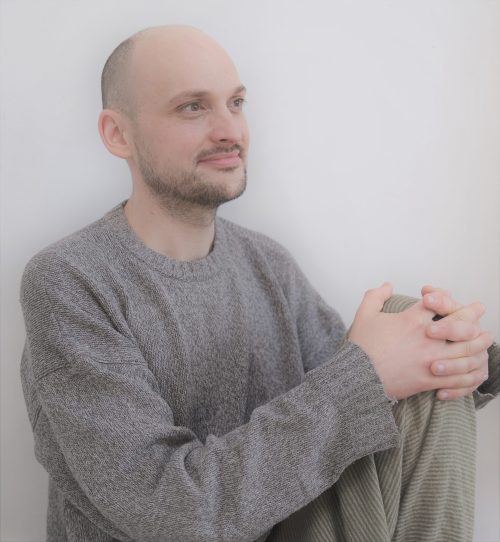
About Me
I am a fully qualified counsellor and registered member of the British Association for Counsellors and Psychotherapists (BACP). I am trained in Humanistic and Integrative Counselling, IFS ( Internal Family Systems Therapy ) to level 2 and IFIO ( Intimacy From The Inside Out ) couples and relationship therapy.
I am working in private practice with adults at the Natural Healing Centre in Cardigan (Mondays), outdoors and in a yurt in a peaceful woodland setting near Brynhoffnant (Thursdays) and Online (weekdays). I work with individuals and couples on a long term or short term basis.
I am a calm and patient person with 10 years of experience working in health and social care, including counselling with Cruse Bereavement Care and Mind. I also have an understanding of mindfulness and spiritual practices with 15 years experience in meditation. I am particularly interested in the relationship between our physical and emotional experiences; how emotions are held in our body.

IFS therapy online. Online IFS therapy. Internal Family Systems Therapy online.

How I work with individuals
I work with a range of people experiencing difficult emotions including grief, anxiety, depression and issues of self-esteem as well as people who are feeling stuck, are going through a significant life change, have wounds from the past, or who want to know and understand themselves better.
The core of my practice is person-centred, which means that first and foremost I aim to understand things from my clients’ perspective, with respect and care. I also take an integrative approach, which means I have a range of different therapies that I may draw on when working with clients where appropriate. In particular I draw on Internal Family Systems (IFS) Therapy, as well as focusing, Polyvagal Informed work and IFIO Couples and Relationship Therapy.
In sessions I work together with my clients offering them the opportunity to share, explore and better understand what is going on for them; allowing them the chance to be understood and heard in a private and impartial space, by a trained professional without judgement.
I don’t give advice, but through careful listening and talking together, I aim to help clients find a greater sense of ease in themselves and in their lives.

IFS (Internal Family Systems) Therapy
IFS is a gentle and compassionate approach to psychotherapy that offers healing to emotionally wounded parts of ourselves.
It understands that we have different ‘parts’ to ourselves like an ‘internal family‘. A simple example might be, ‘part of me would like to go to the party and meet new people, and another part is feeling anxious and doesn’t want to’.
Sometimes we have life experiences which wound or hurt some of our ‘parts’, and other ‘parts’ then try to protect us from the pain of these wounds. Despite this good intention, the ways these ‘protective parts’ try and protect us may cause difficulties in other areas of our lives. IFS acknowledges this good intention and welcomes all our ‘parts’, seeing that there are no ‘bad parts’, even the parts that may be seeming to cause difficulties.
In session, the therapist works with the client so they can understand and befriend their ‘internal family’, and offer healing to any ‘wounded parts’ that may need it, allowing ‘protective parts’ a break from their difficult roles.
It is sensitive approach that goes at the pace of the clients ‘system’, and does not force change, take sides or explore anything without the consent of the whole ‘Internal Family’.



Couples and Relationship Counselling (IFIO)
Relationships can at times be incredibly challenging, sometimes touching on old wounds. Often there is a lot at stake and the emotions can feel very intense. They can however also be a a rewarding resource and opportunities for growth and healing.
Using IFIO therapy (Intimacy form the Inside Out), with individuals or couples the therapist can help people notice and understand the painful cycles or patterns they find themselves in and help them to learn how to do things differently. They can help the couples see the vulnerability beneath these patterns and offer some compassion and healing to them. They can also help people to learn how to have difficult conversations more effectively-how to listen to and speak to each other differently. They create a safe space in which people can get curious about themselves and each other.
“Intimacy from the Inside Out© is a model of couples therapy that draws primarily from the Internal Family Systems (IFS) model of psychotherapy, but also includes aspects of psychodynamic theory, systems thinking and neuroscience. It is an experiential model born out of a desire to carry the concepts of IFS into a relational setting and to use the intimate relationship itself as a vehicle for growth and healing of the individual, as well as the couple.”
Toni Herbine Blank, Founder of IFIO


Where I work
It is important that people feel comfortable and as safe as possible in therapy sessions, and this will mean different things to different people. It is also important that the session are practical in terms of travel and timings. This is why I offer three different options:
In person in Cardigan
I have a light and airy room in the Cardigan Natural Healing Centre that I can use. It is easy to get to, private and comfortable.
Online
For some people it works very well to be able to access therapy sessions online via video call. It reduces travel time and can be done from a place of their choosing.
In a nature setting
Being outdoors and in a nature setting can be a real resource for some people. It can have a positive effect on their well being as well as calming their nervous systems. I have access to a peaceful woodland with covered spaces and a yurt for those that would prefer to work in this setting.

Free initial meeting
Counselling is a very personal experience and I believe it is important to find the right counsellor for you, which is why I offer a free initial meeting of up to 30 mins to give us the opportunity to meet each other and decide if we feel we might work well together. In this meeting my clients have the chance to tell me briefly what brings them to counselling, for me to explain how I work and for us both to ask each other questions.


Sessions after the initial meeting
If after this initial meeting the clients decide they would like to work with me, we would have our first full length session.
In this first session, I would go through some of the practicalities of how the process would work and invite my clients to share some background information that would be useful for me to know and understand as we start the process. With couples the first session also gives us an opportunity to explore whether couples therapy is appropriate or whether individual therapy may be more so.
Following this we would then usually agree to meet for a weekly session, at the same day and time each week. The number of sessions we have differs from client to client but we regularly review the process to ensure it is working for the clients. The clients can choose to finish at any point.

Fees
Initial Meeting (up to 30 mins)
Free of charge
Subsequent regular sessions
In Person
Individuals: £40-70
Couples: £60-85
Online
Individuals: £55-75
Couples: £75-90
Initial meeting up to (30 mins)
Subsequent regular sessions
Free of charge
In person
Online

Individuals: £40-70
Couples: £60-85
Individuals: £55-75
Couples: £75-90

FAQ
Most frequent questions and answers
Counselling is a talking therapy, where you can discuss your emotions, thoughts and behaviours with a trained professional in a safe and confidential space.
In the UK the difference between counselling and psychotherapy is not clear cut or agreed upon, with trainings and practices sharing a lot in common, and the terms often being used interchangeably.
Counselling is sometimes associated with shorter-term work, and a shorter or less in depth training. Psychotherapy is sometimes associated with longer term work and a longer or more in depth training. However this isn’t always the case.
The term ‘Therapist’ is often used generally to describe any type of talking therapist
There a lot of different therapies out there and it can be quite overwhelming when trying to choose which one suits you.
Some people find it helpful to understand some of the broad categories that many of the different therapies fall under.
- Humanistic: These therapies acknowledge a potential for healing and growth in all of us and the therapist aims to support us to access this potential for ourselves. The individual’s unique personal experience is key. Humanistic therapies include person-centred therapy, gestalt therapy, and existential therapy as well as many others.
- Psychoanalytic and Psychodynamic: These therapies have a focus on our unconscious mind and often look at our past experiences. The therapist will encourage you to talk about your experiences and may also share their own interpretations or analysis. Psychoanalytic and Psychodynamic therapies include, Psychoanalysis, Psychoanalytical therapy, Psychodynamic therapy, Jungian psychotherapy, as well as others.
- Behavioural or cognitive behavioural: These therapies are concerned with the effect our thoughts and behaviours have on the way we feel. They work with these thoughts and behaviours to help improve the way we feel. The therapist will generally lead this process and will often give tasks to do outside of the sessions. Behavioural or cognitive behavioural therapies include cognitive behavioural therapy (CBT), behavioural therapy, acceptance and commitment therapy and others.
- Integrative: These therapies acknowledge that there is no one method to suit all of us at all times. Integrative therapists involve aspects of different types of therapy into their practice to suit the individual. There are different ways that therapists might do this and some may have a ‘core’ approach or philosophy.
Sometimes people can find it hard to know how to choose a counsellor or psychotherapist even if they know what sort of therapy they are looking for. The following are some helpful tips
- Choose someone who ‘feels’ right for you. This is really important and some people may argue is more important than the type of therapy being offered. Therapy is a very personal thing. Spend some time reading therapist’s entries on directories or their websites. You’ll probably get a sense of who you might like to work with. If you want to get more of a sense about someone or want to ask them a bit more about how they work, try to arrange a conversation with them. Some therapists offer a free initial meeting for you both to get to know each other and ask questions.
- Choose someone who is a member of a well known and respected professional association or organisation such as the British Association for counsellors and psychotherapists (BACP) or the United Kingdom council for psychotherapy. Counselling and psychotherapy are unregulated in the UK so anyone can call themselves a counsellor or psychotherapist. Membership to one of the associations/organisations mentioned above ensures a very specific level of training and a set of ethics for practice.
- If after one or two sessions you don’t think a therapist is right for you, talk to them about this and try a different one.

Arranging a session and getting in touch
If you would like to arrange an initial free meeting please contact me via email: pip@pipbromley.com.
Alternatively you can use the form below.
Please note that I respond to messages Mon-Friday 9am -5pm and aim to respond within 48 hours. Thanks.
Who we are
Our website address is: https://pipbromley.com.
We can be contacted through the contact form of this website.
Cookies
Cookies are files with small amount of data, which may include an anonymous unique identifier. Cookies are sent to your browser from a web site and stored on your computer’s hard drive.
We use “cookies” to collect information. You can instruct your browser to refuse all cookies or to indicate when a cookie is being sent. However, if you do not accept cookies, you may not be able to use some portions of our Service.
Embedded content from other websites
Articles on this site may include embedded content (e.g. videos, images, articles, etc.). Embedded content from other websites behaves in the exact same way as if the visitor has visited the other website.
These websites may collect data about you, use cookies, embed additional third-party tracking, and monitor your interaction with that embedded content, including tracking your interaction with the embedded content if you have an account and are logged in to that website.
Who we share your data with
We do not share your data.
How long we retain your data
If you submit a contact form: The information you submit will be stored in order to respond to your enquiry and will be deleted when no longer needed, or required for legal or insurance purposes.
What rights you have over your data
If you have submitted a contact form on this site: You can request to receive an exported file of the personal data we hold about you, including any data you have provided to us. You can also request that we erase any personal data we hold about you. This does not include any data we are obliged to keep for administrative, legal, or security purposes.
Where we send your data
Contact forms may be checked through an automated spam detection service

